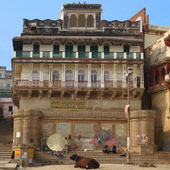Design Resource
Architecture of Varanasi
The Land of Spirituality
by
Varanasi is also popularly known as Kashi. Living up well to the meaning of its name; the word Kashi is derived from the Sanskrit word काशि meaning ‘where the cosmic light concentrates in circle’, or simply ‘illumination’. Located in Uttar Pradesh it is considered to be the holiest amongst the Sapta Puri's. The epicentre of devotement - Jainism, Hinduism and Buddhism have had coinciding paths and longstanding associations with Kashi, which has also witnessed an intrusion by the Mughals - connecting it to Islam as well.
The entire city boasts of an ancient feel - the narrow streets, detailed structures, peeling paint on the walls, public transport, unplanned constructions and kaccha roads. Be it the Benaras Hindu University (BHU) or the Observatory in the ManMandir Ghat built by Raja Man Singh they remain depictions of heritage Indian architecture. The sandstone used in this region over the years has been sourced from Chunar and Mirzapur.
The city is dotted with chai shops, temples in every nook and cranny, niches filled with skilled Paanwalla’s, makeshift abodes of sages and gurus, and overnight lodgings of vagrants in abandoned ruins, Thela's of local food and chaat. Kashi balances cautiously on the scales of art, culture and deep-rooted spirituality, on one hand, edging unconsciously towards appearing like an unplanned city with an overwhelming population in self-neglect, living a contradicting life.
Yet, according to eastern philosophy, the shaping of the cultural and architectural landscape of Varanasi is based upon cosmological principles. A popular belief is that Varanasi is located at the centre of the earth, where the complete sacred universe convenes here in a symbolic mandala. The Manasara, a text about Hindu Architecture from the 10th century states that – the design of this Hindu city is established on the ‘Cosmic Cross’ the essential points, which are the corners of the macrocosm – making the entire city a divine city – or a cosmogram. Varanasi is not only a place of creation but also believed to be a crossing place (Teerth) between this world and the otherwordly brahman.


